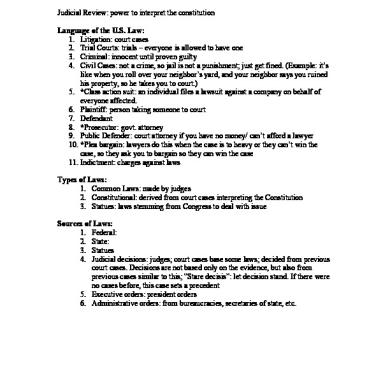Chapter 14 - The Judiciary
This document was uploaded by user and they confirmed that they have the permission to share it. If you are author or own the copyright of this book, please report to us by using this DMCA report form. Report DMCA
Overview
Download & View Chapter 14 - The Judiciary as PDF for free.
More details
- Words: 353
- Pages: 3
Chapter 14: The Judiciary Judicial Review: power to interpret the constitution Language of the U.S. Law: 1. Litigation: court cases 2. Trial Courts: trials – everyone is allowed to have one 3. Criminal: innocent until proven guilty 4. Civil Cases: not a crime, so jail is not a punishment; just get fined. (Example: it’s like when you roll over your neighbor’s yard, and your neighbor says you ruined his property, so he takes you to court.) 5. *Class action suit: an individual files a lawsuit against a company on behalf of everyone affected. 6. Plaintiff: person taking someone to court 7. Defendant 8. *Prosecutor: govt. attorney 9. Public Defender: court attorney if you have no money/ can’t afford a lawyer 10. *Plea bargain: lawyers do this when the case is to heavy or they can’t win the case, so they ask you to bargain so they can win the case 11. Indictment: charges against laws Types of Laws: 1. Common Laws: made by judges 2. Constitutional: derived from court cases interpreting the Constitution 3. Statues: laws stemming from Congress to deal with issue Sources of Laws: 1. Federal: 2. State: 3. Statues 4. Judicial decisions: judges; court cases base some laws; decided from previous court cases. Decisions are not based only on the evidence, but also from previous cases similar to this; “Stare decisis”: let decision stand. If there were no cases before, this case sets a precedent 5. Executive orders: president orders 6. Administrative orders: from bureaucracies, secretaries of state, etc.
Court – U.S System U.S District Courts Jurisdiction: means power Limited jurisdiction U.S Courts of Appeal Appellate Jurisdiction U.S. Supreme Court Appellate Jurisdiction Federal Judges: appointed by president, approved by Senate Dept. of Justice: bureaucracy; govt. agency Dual Court System: two court system: state & federal
Supreme Court
Courts of Appeals for Federal Court
Courts of Appeal
Tax Court
Bank
District
Territorial Courts
Federal Regulatory Agencies
Court of International Trade
Court of Federal Claims
Court of Veterans & Appeals
Judges as Policy Makers: Courts make common law – by deciding cases and establishing principles that bind future cases based on cases.
Court – U.S System U.S District Courts Jurisdiction: means power Limited jurisdiction U.S Courts of Appeal Appellate Jurisdiction U.S. Supreme Court Appellate Jurisdiction Federal Judges: appointed by president, approved by Senate Dept. of Justice: bureaucracy; govt. agency Dual Court System: two court system: state & federal
Supreme Court
Courts of Appeals for Federal Court
Courts of Appeal
Tax Court
Bank
District
Territorial Courts
Federal Regulatory Agencies
Court of International Trade
Court of Federal Claims
Court of Veterans & Appeals
Judges as Policy Makers: Courts make common law – by deciding cases and establishing principles that bind future cases based on cases.
Related Documents

Chapter 14 - The Judiciary
June 2020 10
The Judiciary Choiceboard
June 2020 3
Chapter 14
November 2019 33
Chapter 14
November 2019 17
Chapter 14
November 2019 24